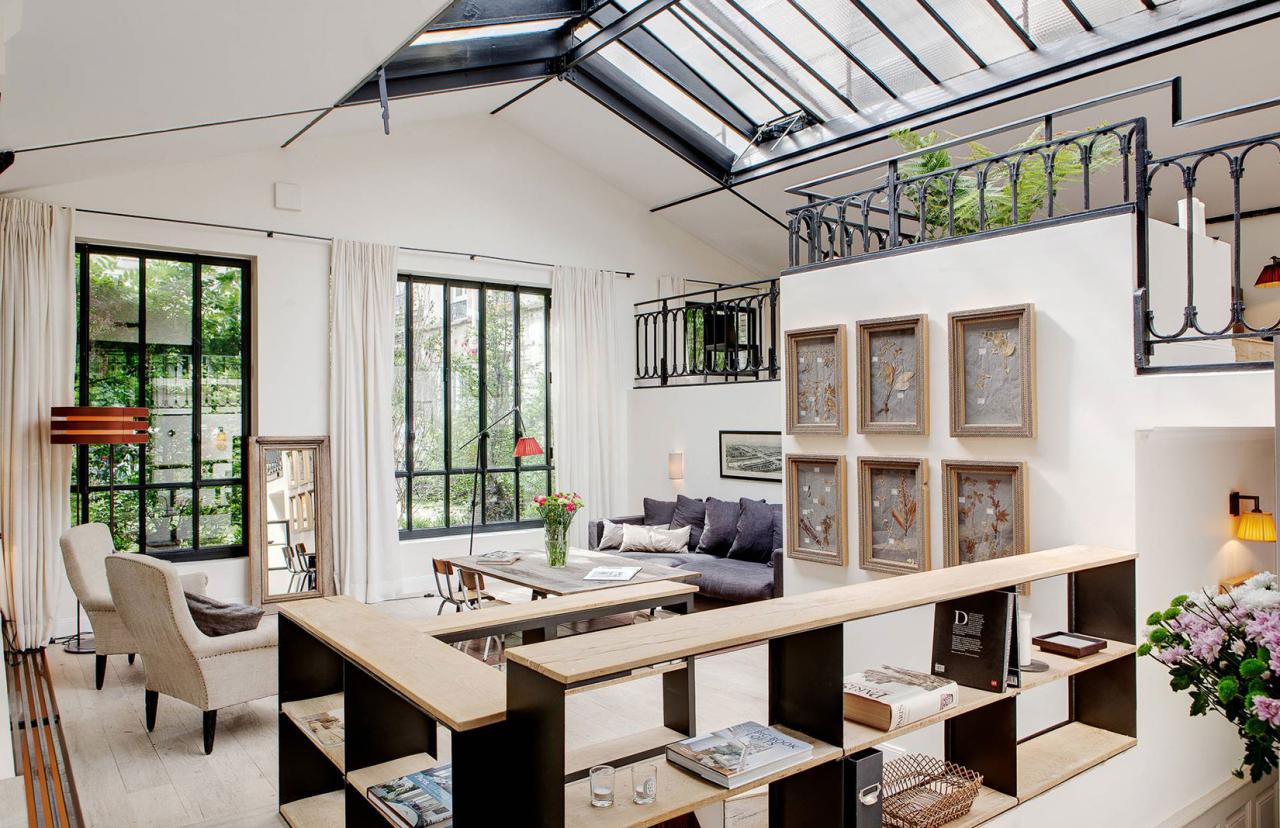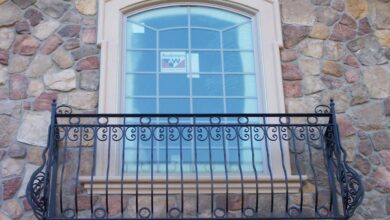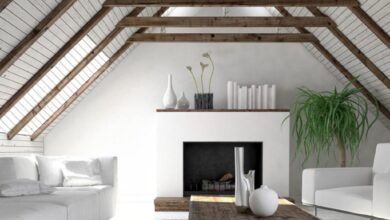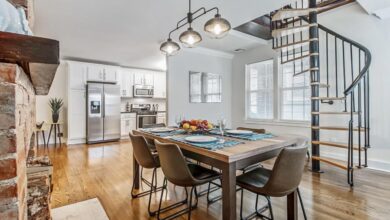Renting an apartment in Paris A Guide
Renting an apartment in Paris: The City of Lights beckons, but navigating the Parisian rental market can feel like deciphering a secret code. From charming studios in Montmartre to spacious apartments in the Marais, finding your perfect Parisian pied-à-terre requires careful planning and understanding of the local customs. This guide unravels the complexities, offering practical advice and insider tips to help you secure your dream Parisian apartment.
We’ll explore everything from finding the right neighborhood and apartment type to understanding the rental process, budgeting for expenses, and navigating the legal aspects of a Parisian lease. Whether you’re a student, young professional, or family, we’ll equip you with the knowledge to make your Parisian apartment hunt a success.
Finding Apartments

Source: thespaces.com
Finding the perfect Parisian apartment can feel like navigating a labyrinth, but with a little planning and research, you can find your ideal home in the City of Lights. This section will guide you through the process, from understanding the Parisian rental market to choosing the best approach for your search.
Finding an apartment in Paris can be tricky, especially with the competitive rental market. However, securing a place is definitely worth the effort, especially if you’ve landed a great job like those offered at Pertamina Patra Niaga, for example, check out their career prospects for chemical engineering graduates here: Prospek karir di Pertamina Patra Niaga bagi lulusan teknik kimia.
Once you’ve sorted out your career, settling into Parisian life with a cozy apartment will feel much more achievable.
Popular Parisian Neighborhoods for Apartment Rentals
Choosing a neighborhood is a crucial first step. The right area will depend on your budget, lifestyle, and priorities. The following table categorizes some popular neighborhoods based on these factors. Remember that prices can fluctuate, and these ranges are estimates based on average rental costs.
Finding an apartment in Paris can be tricky, especially with the competitive rental market. However, securing a place is definitely worth the effort, especially if you’ve landed a great job like those offered at Pertamina Patra Niaga, for example, check out their career prospects for chemical engineering graduates here: Prospek karir di Pertamina Patra Niaga bagi lulusan teknik kimia.
Once you’ve sorted out your career, settling into Parisian life with a cozy apartment will feel much more achievable.
| Neighborhood | Price Range (monthly, €)* | Lifestyle | Transportation Access |
|---|---|---|---|
| Le Marais | 1800 – 4000+ | Trendy, historic, vibrant nightlife, LGBTQ+ friendly | Excellent (Metro, bus) |
| Saint-Germain-des-Prés | 2500 – 6000+ | Upscale, chic, literary history, high-end boutiques | Good (Metro, bus) |
| Latin Quarter | 1500 – 3500+ | Student-centric, lively, historical, many cafes and bookstores | Excellent (Metro, bus, RER) |
| Canal Saint-Martin | 1600 – 4000+ | Hipster, trendy, young professionals, canal-side walks | Good (Metro, bus) |
| Belleville | 1200 – 2500+ | Diverse, multicultural, family-friendly, more affordable | Good (Metro, bus) |
| Montmartre | 1500 – 3500+ | Artistic, bohemian, charming, touristy | Good (Metro, funicular) |
Note
These are approximate ranges and can vary greatly depending on the size and condition of the apartment.
Types of Parisian Apartments
Parisian apartments come in a variety of styles and sizes to suit different needs and preferences.
Studios: Small, self-contained units typically consisting of a single room serving as a living space, bedroom, and kitchen area. They are often the most affordable option but lack space.
One-Bedroom Apartments: Offer a separate bedroom and living area, providing more privacy and space than studios. Kitchens are usually separate, and bathrooms are typically smaller than in larger apartments.
Two-Bedroom Apartments: Provide more space for families or those who need additional bedrooms for guests or home offices. These apartments often include separate living and dining areas.
Duplexes: Spanning two floors within a building, offering more space and often unique architectural features. They frequently have high ceilings and a more luxurious feel.
Lofts: Often found in converted industrial buildings, these apartments feature high ceilings, exposed brick or beams, and open-plan living spaces. They tend to be more expensive and stylish.
Renting Through Agencies vs. Directly from Landlords
Choosing between renting through an agency or directly from a landlord involves weighing the advantages and disadvantages of each approach.
Renting Through Agencies: Agencies handle much of the paperwork and legal aspects, offering a smoother process for those unfamiliar with French rental laws. However, they typically charge fees, which can be substantial. They may also have a wider selection of properties, but this can also mean less personalized service.
Renting Directly from Landlords: This option can potentially save you agency fees, allowing for a more direct negotiation of rental terms. However, you’ll be responsible for handling all aspects of the lease, including legal documentation and communication with the landlord. Finding suitable listings might require more effort.
The Rental Process
Renting an apartment in Paris can seem daunting, but with careful planning and preparation, the process can be smooth and efficient. Understanding the steps involved, the necessary documentation, and having a well-organized checklist are crucial for a successful rental experience. This section Artikels the typical process, from your initial apartment search to signing the lease.
The rental process in Paris differs significantly from other countries. Be prepared for a more formal and thorough vetting process, as landlords carefully assess prospective tenants’ financial stability and reliability.
Steps Involved in Renting an Apartment in Paris
The steps involved in securing a Parisian apartment rental typically follow a sequential order. While variations exist depending on the landlord and the specific property, this sequence provides a general overview of what to expect.
- Finding an Apartment: This involves searching online portals, working with real estate agents ( agents immobiliers), or directly contacting landlords. (This step was covered previously.)
- Viewing the Apartment: Once you’ve identified potential apartments, schedule viewings. Be punctual and prepared to ask questions.
- Submitting an Application: If you are interested in renting the apartment, you will need to submit a formal application to the landlord or their agent. This usually involves providing the required documents (detailed below).
- Waiting for Approval: Landlords often take time to review applications and conduct background checks. This can range from a few days to several weeks.
- Negotiating the Lease: Once approved, you will need to negotiate the terms of the lease agreement. This includes the rental price, the duration of the lease, and any included utilities.
- Signing the Lease: After agreeing on the terms, you will sign the lease ( bail) and pay the required deposits and fees.
- Moving In: Once the lease is signed and the necessary payments are made, you can move into your new Parisian apartment.
Required Documents for a Rental Application
Landlords in Paris require extensive documentation to assess your ability to pay rent and ensure you are a responsible tenant. Failing to provide complete documentation can significantly delay or even prevent approval.
- Proof of Identity: Passport or National Identity Card.
- Proof of Income: Payslips ( bulletins de salaire) for the past three months, employment contract, bank statements, or proof of other regular income.
- Proof of Address: Utility bill or bank statement showing your current address.
- Bank References: A letter from your bank confirming your account details and financial standing.
- Guarantor (often required): A guarantor ( garant) is frequently required, especially for those without a significant income or rental history in France. The guarantor must provide proof of their income and address.
- Rental Application Form: A completed application form provided by the landlord or agent.
Rental Application Checklist
This checklist helps ensure you are fully prepared at each stage of the application process. Having all necessary documents readily available will expedite the process significantly.
| Stage | Tasks | Documents |
|---|---|---|
| Application Submission | Gather all required documents; complete application form. | Passport/ID, Proof of income (3 months payslips, contract, bank statements), Proof of address, Bank references, Guarantor information (if required). |
| Landlord Review | Wait for landlord response; prepare questions. | None (but keep copies of submitted documents) |
| Lease Negotiation | Review lease terms; clarify any uncertainties. | Lease agreement (bail) |
| Lease Signing | Sign lease; pay deposits and fees. | Signed lease, proof of payment. |
| Move-In | Arrange for utilities; begin moving. | Utility contracts. |
Costs and Budgeting
Renting an apartment in Paris can be an exciting but expensive undertaking. Understanding the various costs involved and developing a robust budget is crucial for a smooth and stress-free experience. This section will break down typical monthly expenses, payment methods, and budgeting strategies to help you navigate the financial aspects of Parisian apartment living.
Finding an apartment in Paris can be a real adventure, requiring careful planning and a bit of luck. You’ll need to consider factors like location and budget, just like understanding the logistics of a complex system, such as the efficient fuel distribution network described in this article on Pertamina Patra Niaga’s efficient fuel distribution. Once you’ve secured your Parisian pad, though, the rewards are well worth the effort!
Typical Monthly Rental Costs
The cost of renting in Paris varies significantly depending on location, size, amenities, and the type of apartment (furnished or unfurnished). The following table provides a general overview of average, high-end, and low-end monthly costs. Remember that these are estimates, and actual costs can vary.
Finding an apartment in Paris can be tricky, requiring a lot of legwork and negotiation. My experience managing budgets, honed during my time as a sales representative – check out my experience Pengalaman kerja di Pertamina Patra Niaga sebagai sales representative – proved surprisingly useful in securing a reasonable rent. Ultimately, securing a Parisian apartment is a testament to persistence and shrewd bargaining.
| Expense Category | Average Cost (€) | High-End Cost (€) | Low-End Cost (€) |
|---|---|---|---|
| Rent | 1500 | 3000+ | 800 |
| Utilities (water, electricity, gas, internet) | 150 | 300 | 100 |
| Homeowners/Renters Insurance | 15 | 30 | 10 |
| Transportation (Navigo Pass) | 75 | 75 | 75 |
| Groceries | 300 | 600 | 150 |
| Other Expenses (Phone, Entertainment, etc.) | 200 | 500 | 50 |
Common Payment Methods
Rent in Paris is typically paid monthly, often via bank transfer. Landlords may also accept checks, but bank transfers are becoming increasingly common and preferred. It’s essential to clarify the preferred payment method with your landlord during the rental process. Some landlords might require a security deposit, usually equivalent to one or two months’ rent, paid upfront.
Finding an apartment in Paris can be tricky, especially with the competitive rental market. However, securing a place is definitely worth the effort, especially if you’ve landed a great job like those offered at Pertamina Patra Niaga, for example, check out their career prospects for chemical engineering graduates here: Prospek karir di Pertamina Patra Niaga bagi lulusan teknik kimia.
Once you’ve sorted out your career, settling into Parisian life with a cozy apartment will feel much more achievable.
This deposit is returned at the end of the tenancy, after any necessary deductions for damages.
Budgeting Strategies
Creating a detailed budget before you start your apartment search is essential. Consider the following strategies:
First, determine your maximum monthly rental budget. This should include not only rent but also all other associated expenses listed in the table above. Factor in unexpected costs as well, such as repairs or moving expenses. A good rule of thumb is to aim for a total monthly housing cost that doesn’t exceed 30% of your gross monthly income.
Second, track your spending for a few months to get a clear picture of your current expenses. This will help you identify areas where you can cut back to free up funds for rent. Use budgeting apps or spreadsheets to monitor your income and expenses effectively.
Third, explore different neighborhoods to find one that fits your budget and lifestyle. Areas further from the city center tend to have lower rental costs. Consider sharing an apartment with roommates to reduce individual expenses. Finally, don’t forget to account for initial costs like the security deposit and any agency fees.
Legal and Contractual Aspects
Renting an apartment in Paris involves navigating a specific legal framework. Understanding the key aspects of the rental contract and associated legal requirements is crucial for a smooth and problem-free tenancy. This section will Artikel the typical lease duration, the security deposit system, and provide a glossary of essential French terms.
Lease Duration
The standard length of a Parisian rental lease agreement is typically one year, though longer leases are possible, particularly for furnished apartments. Shorter-term rentals are available but often come with higher costs and less tenant protection. Renewal is usually subject to mutual agreement between the landlord and tenant. Landlords may choose not to renew the lease after one year, often providing notice several months in advance.
Conversely, tenants typically have the right to renew their lease unless there are specific legal grounds for termination by the landlord (e.g., renovations).
The Dépôt de Garantie (Security Deposit)
The “dépôt de garantie,” or security deposit, is a sum of money paid by the tenant to the landlord at the beginning of the lease. It’s designed to cover potential damages to the property during the tenancy. The amount is legally capped at one month’s rent for unfurnished apartments and two month’s rent for furnished apartments. This deposit is returned to the tenant at the end of the lease, after a thorough inspection of the property to assess any damages.
Any deductions for repairs are documented and justified. Disputes over the return of the deposit are relatively common, and tenants should carefully document the condition of the apartment upon moving in, ideally with photographic evidence. Tenants should also be aware of their rights regarding the return of their deposit, and how to pursue legal action if necessary.
Essential French Terms
Understanding key French terms related to renting is essential for navigating the process. This glossary provides definitions for frequently encountered vocabulary:
| French Term | English Translation | Explanation |
|---|---|---|
| Bail | Lease | The rental contract itself. |
| Loyer | Rent | The monthly payment for the apartment. |
| Charges | Charges | Additional fees covering building maintenance, water, etc. |
| Dépôt de garantie | Security deposit | Money held by the landlord to cover potential damages. |
| État des lieux | Inventory of fixtures | A detailed inventory of the apartment’s condition at the start and end of the lease. |
| Propriétaire | Landlord | The owner of the property. |
| Locataire | Tenant | The person renting the property. |
| Agence immobilière | Real estate agency | A company that helps with finding and renting apartments. |
Neighborhood Guides
Choosing the right neighborhood in Paris is crucial for a positive rental experience. The city’s arrondissements (districts) each possess a unique character, offering different lifestyles and amenities. This guide explores three distinct areas, highlighting their strengths and helping you find the perfect fit.
Le Marais: Historic Charm and Chic Living, Renting an apartment in Paris
Le Marais is a captivating blend of history and modern sophistication.
This historic district, located in the heart of Paris, boasts stunning architecture, from medieval buildings to elegant 17th-century hôtels particuliers. Cobblestone streets wind through charming squares, lined with boutiques, art galleries, and trendy restaurants. The atmosphere is vibrant and cosmopolitan, attracting a diverse mix of residents and visitors. Transportation is excellent, with numerous metro stations providing easy access to other parts of the city.
Finding an apartment in Paris can be tricky, especially with the competitive rental market. However, securing a place is definitely worth the effort, especially if you’ve landed a great job like those offered at Pertamina Patra Niaga, for example, check out their career prospects for chemical engineering graduates here: Prospek karir di Pertamina Patra Niaga bagi lulusan teknik kimia.
Once you’ve sorted out your career, settling into Parisian life with a cozy apartment will feel much more achievable.
Le Marais is known for its high concentration of shops, ranging from independent boutiques to high-end designer stores. Foodies will be delighted by the diverse culinary scene, with everything from traditional French bistros to innovative international cuisine. Cultural attractions abound, including the Picasso Museum, the Carnavalet Museum (dedicated to the history of Paris), and the Place des Vosges, one of the city’s oldest planned squares.
The overall ambiance is one of sophisticated elegance, mixed with a lively, youthful energy. Le Marais is ideal for those seeking a central location with easy access to cultural attractions and a vibrant social scene. It’s also a popular choice for young professionals and couples.
Saint-Germain-des-Prés: Literary Heritage and Upscale Living
Saint-Germain-des-Prés exudes an air of intellectual and artistic refinement.
This Left Bank neighborhood is steeped in literary and artistic history, having been a haven for artists and intellectuals for centuries. The architecture is a mix of elegant Haussmannian buildings and charming older structures. The streets are lined with bookstores, cafes, and art galleries, creating a sophisticated and intellectual atmosphere. Transportation is readily available through the metro and bus network.
Saint-Germain-des-Prés is home to a number of high-end boutiques, antique shops, and art galleries. The culinary scene is renowned for its upscale restaurants, attracting both locals and tourists. The neighborhood boasts a number of important cultural attractions, including the Église de Saint-Germain-des-Prés (a historic church), the Musée du Luxembourg (housing temporary exhibitions), and numerous art galleries. The overall ambiance is one of quiet sophistication and intellectual stimulation.
Saint-Germain-des-Prés is well-suited for those seeking a refined and cultured lifestyle. It tends to attract a more mature and affluent clientele.
Montmartre: Bohemian Spirit and Artistic Flair
Montmartre retains a unique bohemian charm, a captivating blend of artistry and everyday life.
Located on a hill in northern Paris, Montmartre is famous for its artistic heritage and bohemian spirit. The architecture is a mix of charming older buildings and more modern structures. The streets are narrow and winding, leading to the iconic Sacré-Cœur Basilica, which offers stunning panoramic views of the city. The atmosphere is lively and artistic, with numerous artists, musicians, and performers adding to the vibrant street life.
While public transportation is available, it’s slightly less convenient than in other central areas. Montmartre is home to many small shops, cafes, and restaurants, many catering to tourists. The culinary scene is diverse, ranging from traditional French bistros to international cuisine. The neighborhood is renowned for its artistic heritage, with the Place du Tertre being a popular spot for artists to display and sell their work.
The overall ambiance is one of romantic charm and artistic inspiration. Montmartre is a great choice for those seeking a unique and artistic atmosphere, but be aware that it can be quite touristy. It attracts a diverse range of residents, from artists and students to families and tourists.
Finding the perfect Parisian apartment can be a challenge, requiring careful consideration of location and budget. However, planning a road trip across Indonesia to visit family afterwards? You’ll need to know where to refuel; check out this comprehensive list of Pertamina gas stations across the archipelago: Daftar lengkap SPBU Pertamina Patra Niaga di seluruh Indonesia. Once your Indonesian adventure is over, you can happily return to your cozy Parisian rental.
Tips for Successful Apartment Hunting
Finding the perfect Parisian apartment can be challenging, but with a strategic approach and some key knowledge, you can significantly increase your chances of success. This section provides practical tips to navigate the rental market effectively, from negotiating lease terms to effectively communicating with landlords and agencies.
Negotiating Rent and Lease Terms
Negotiating in Paris is common, especially for longer-term leases. While landlords may be less flexible than in some other markets, it’s still worthwhile to attempt negotiations, particularly regarding the deposit amount or the inclusion of certain utilities in the rent. Knowing the average rental prices for comparable apartments in the neighborhood will strengthen your negotiating position. Be polite but firm, and present your case clearly and concisely.
For example, if the advertised rent is slightly above your budget, you might propose a slightly lower monthly rent in exchange for a longer lease term. Remember to always maintain a professional and respectful demeanor throughout the process.
Thorough Apartment Inspection Before Signing a Lease
Before signing any lease agreement, a comprehensive inspection of the apartment is crucial. This involves checking for any existing damages, verifying the functionality of all appliances and fixtures (plumbing, electricity, heating), and assessing the overall condition of the property. Take photos or videos of any issues you discover, and ensure these are documented in writing within the lease agreement or a separate inventory report.
If you find significant problems, this is a valuable opportunity to negotiate repairs or a reduction in the rent. Ignoring this step could lead to costly repairs or disputes later on.
Effective Communication with Landlords or Agencies in French
While many landlords and agencies in tourist areas might speak English, proficiency in basic French phrases will significantly enhance your experience and demonstrate your seriousness as a tenant. It’s advisable to learn some key phrases related to apartment viewing, lease negotiations, and property conditions.
Useful phrases include: “Bonjour Madame/Monsieur,” (Good morning/afternoon Madam/Sir), “Je suis intéressé(e) par cet appartement,” (I am interested in this apartment), “Pouvez-vous me donner plus de détails?” (Can you give me more details?), “J’ai remarqué quelques problèmes…” (I noticed some problems…), and “Merci pour votre temps.” (Thank you for your time).
Learning a few key phrases can significantly improve your interactions and show respect for local customs. Even a simple attempt at French will often be appreciated. For more complex negotiations, consider using a translator or seeking assistance from a bilingual friend or professional.
Summary: Renting An Apartment In Paris
Securing a Parisian apartment is a rewarding experience, blending the excitement of a new adventure with the satisfaction of finding the perfect home. By understanding the nuances of the rental market, from researching neighborhoods and comparing rental options to mastering the negotiation process and understanding legal requirements, you can confidently navigate the path to Parisian apartment living. Remember to stay organized, be persistent, and embrace the unique charm of Parisian apartment hunting – the perfect apartment awaits!
Clarifying Questions
What’s the best time of year to look for an apartment in Paris?
Spring and fall generally offer a wider selection of apartments and potentially more negotiating power.
How important is speaking French when renting in Paris?
While many agencies and landlords speak English, knowing some basic French phrases will significantly enhance your experience and communication.
Are pets allowed in Parisian apartments?
Pet policies vary greatly depending on the landlord or agency. Always inquire beforehand.
What are the typical notice periods for breaking a lease?
Lease terms and notice periods are specified in the contract. Typically, they range from one to three months.
Can I pay rent online?
While cash and checks are still accepted, many landlords now offer online payment options.









